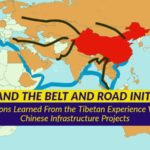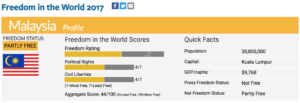| Malaysia is somewhat of a puzzle, notes Marvin C. Ott, senior scholar at the Wilson Center and visiting professor at Johns Hopkins University. The Federation, as it is also known, has obvious intrinsic importance. It is at the geographic center of Southeast Asia and the one country in the region that bridges its peninsular and archipelagic divide. It is also a “third world” success story on multiple dimensions: economic development, political democracy and multiethnic cooperation. The Federation constitutes perhaps the best example of a predominantly Muslim country achieving successful, multi-faceted modernization, he writes for The National Interest:
 Malaysia’s political transition has coincided with a rapidly changing and very challenging regional security environment. Malaysia is key to China’s Belt and Road strategy and, under Najib, seemed to have made major inroads there in the form of influence and economic presence—including personal payments to the prime minister. A veteran, strong-willed Malaysian leader with public opinion at his back is now carefully, but unmistakably, challenging those inroads. The implications for U.S. strategic interests are obvious. Malaysia’s political transition has coincided with a rapidly changing and very challenging regional security environment. Malaysia is key to China’s Belt and Road strategy and, under Najib, seemed to have made major inroads there in the form of influence and economic presence—including personal payments to the prime minister. A veteran, strong-willed Malaysian leader with public opinion at his back is now carefully, but unmistakably, challenging those inroads. The implications for U.S. strategic interests are obvious.
The new coalition government has committed itself to a reform agenda that envisions Malaysia as a fully mature, just, equitable and effective democracy, says Anwar Ibrahim, the leader of Malaysia’s ruling Pakatan Harapan coalition. Ending corruption is but one item on our agenda. Establishing an independent judiciary, election commission and free press, and nurturing active civil-society organisations, are also necessary to ensure free, fair, and open elections, deliver justice and see that there is an equitable provision of public goods and services, he writes for The South China Morning Post.
 Malaysia is a rare bright spot for rights and democracy in Southeast Asia this year—in fact one of the few global bright spots for democracy in 2018, Council on Foreign Relations analyst Joshua Kurlantzick adds. Malaysia is a rare bright spot for rights and democracy in Southeast Asia this year—in fact one of the few global bright spots for democracy in 2018, Council on Foreign Relations analyst Joshua Kurlantzick adds.
Anwar is highly regarded for his stance against corruption and his skillful management of the Malaysian economy during the Asian financial crisis, the National Endowment for Democracy adds. He has called for bold reforms to Malaysia’s political economy in order for it to remain competitive in the 21st century. He believes an independent judiciary, free media, and respect for the rule of law are the foundations on which Malaysia’s economic strength can be expanded. He further believes that the government must not ignore the plight of the poor and marginalized and should take active steps to create a humane economy. The multiethnic People’s Justice Party that he leads has provided a template for how Malaysia’s diverse ethnic and religious groups can work together toward a common national objective.
 Throughout his career, Anwar has articulated a compelling argument in support of greater understanding between civilizations. At a time when many have described an inevitable clash, Anwar’s view is that dialogue is necessary and vital. He has a unique ability and standing across the Muslim world to address the complex issues that hinder growth and development and to demonstrate the compatibility of democracy with Muslim peoples. Throughout his career, Anwar has articulated a compelling argument in support of greater understanding between civilizations. At a time when many have described an inevitable clash, Anwar’s view is that dialogue is necessary and vital. He has a unique ability and standing across the Muslim world to address the complex issues that hinder growth and development and to demonstrate the compatibility of democracy with Muslim peoples.
The Embassy of Canada and The National Endowment for Democracy request that you save the date for the fifteenth annual SEYMOUR MARTIN LIPSET LECTURE ON DEMOCRACY IN THE WORLD
Anwar Ibrahim, President, People’s Justice Party of Malaysia
Monday, February 11, 2019
6:00 p.m. to 8:30 p.m.
The Embassy of Canada
501 Pennsylvania Avenue, NW
Washington, DC |